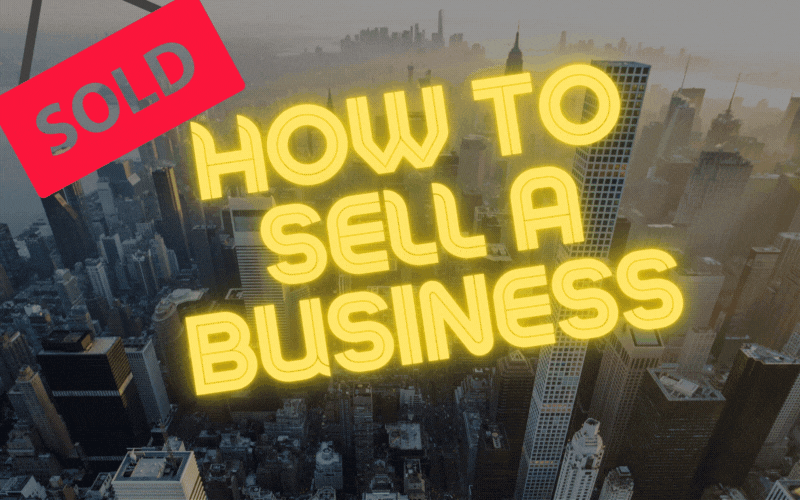
Expert Advice On Selling an Ecommerce Business in 2023:
This article is the definitive how to guide on selling e commerce businesses in 2023!
I’m George Moulos from Ecommerce Brokers, I’m an online business broker that has been helping people build, buy, and sell ecommerce businesses for over a decade.
We also have a video about how to sell an ecommerce business below and you can Subscribe Here!
I’m going to take you through how to sell a business and at the end of this article I’m going to give you 3 hacks for getting a higher valuation.
Selling E Commerce Business: What Type Can You Sell?
Before we dive into the HOW we need to define WHAT we mean by ecommerce business. Generally speaking if the business is generating revenue ecommerce it is an asset that can be sold. That being said there are buyer preferences when it comes to the type of ecommerce assets they like to buy. This means that there is a skewed share of the businesses that are sold ecommerce. In order of most popular acquisitions to least:
- Shopify/Wordpress DTC Ecommerce Businesses
- Amazon FBA Business
- Shopify/Wordpress Dropshipping Business
- Marketing Agency Business
- Google AdSense or Display Advertising Business
- Affiliate Sites/ Amazon Affiliates Business
- SaaS Business
- Mobile App Business
- Productized service business
1. Overview of the Selling E Commerce Business Journey
Selling an ecommerce business should be one of, if not THE defining moment of your businesses journey and even perhaps your journey as an entrepreneur. That’s not to say it isn’t a process that takes time, effort and diligence.
Selling your business and the 2-6 month process will become a project of it’s own and there are many processes and difficulties you will face. For this reason we’ve put this article together to give you the secrets of the ecommerce business selling process that the Ecommerce Brokers team has gathered from 10 years of selling businesses.

2. Is Your Business Sale Ready?
Before you list your business you need to ask yourself if your business is actually ready for an exit. Most business owners think about exiting their business far too late and their business usually declines in sales months as the owners mentally check out of the business.
The best time to sell a business is usually when you’re not thinking about selling at all. When the business is growing month on month and everything is going great, that’s the best time to sell. Your prospective buyers will love the trailing twelve months revenue and profit figures and they will see a lot of potential in the business post-acquisition.
If you sell your business a few months after a peak and your businesses revenue, profitability or growth has declined the business likely isn’t ready for a sale and you would highly benefit from dedicating 3 months to growing the business prior to an exit.
If you are looking for some exit planning advice, we provide this at Ecommerce Brokers. Follow the link in the description below to book a call with a broker.
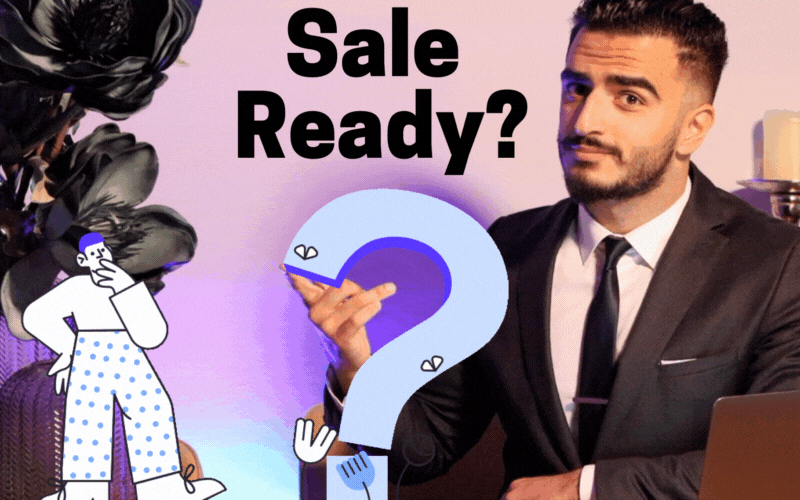
3. Selling E Commerce Business & Exit Planning
Having a no exit plan can mean an unsatisfying sale that will do nothing more than cut your losses on maybe the last 12 months stock and expenses and not to much to set you up for your next venture or investment. A good exit plan will mean you sell your business when it is doing it’s best numbers in recent months and it will mean you see 3-4 times your businesses trailing 12 months net profit in one payment!
This is the biggest win in running an ecommerce business! 3 to 4 years of your businesses profit in one single payment is a major success and will likely be the defining moment of your business career (at least up to this point). For this reason having an exit plan months and years before you actually plan to exit is VITAL! I cannot stress this enough.
The best time to start exit planning is before you start your business. The second best time is when it is already operating. The first time you might think to start exit planning is when your business has seen some substantial sales and reaches at least the 12 month mark. At this point your business enters the criteria at which the majority of ecommerce business acquire. Business buyers want to buy profitable, growing businesses that are at least one year old. So it is imperative that you have at least 3 months of continuous growth heading into a sale.
This might mean you need to hold off on listing your business until your business’ figures are impressive enough to get the valuation you want.
At Ecommerce Brokers we offer exit planning services as part of our selling process and you can get a free consultation here!
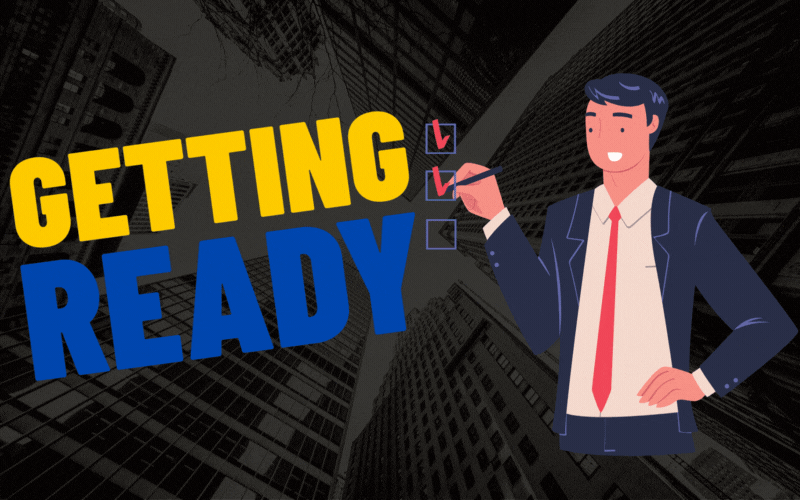
Increase Defensibility
One of the most important factors buyers look for when buying a business is how defensible it is. As previously mentioned the question that buyers ask when buying a business is “could i start this business from scratch and achieve this success on my own with the amount of money I’m about to buy this business for?”.
The biggest deciding factor for answering that question with “No!” is having a highly defensible business. This comes down to a few factors:
A) Supplier Agreements.
This ideally is exclusivity agreements for products, but even on specific designs is fine.
B) Patents.
This isn’t always possible but if you can do this it is a HUGE bonus for buyers.
C) Trademarks.
This is mandatory. If you don’t have the trademark for your business name at least for the jurisdiction in which you operate it is a major red flag for buyers. It would be a bonus to get the trademark for your brand in the future geographies you’d like to operate with. Trademarks will also mean you can DMCA (Digital Millennium Copyright Act) competitors for copying your trademark and they’ll be taken down on Facebook, Instagram and Amazon.
D) Unique Designs:
Having in house designers that create unique designs that are exclusive to your brand means the brand will be able to create new unique designs under the new owner and continue as before.
E) Website Design & Sales Funnel.
Having a custom built or unique website or sales funnel will add value to your business.
F) SEO Ranking.
Rankings take time and investment so this is a massive defensibility factor.
G) Social Media Followings.
Once again this takes time, investment and trust between customer and the business.
H) Reviews.
This is the major sign of an established brand and is the first thing a new business struggles with and a huge point of value to a buyer.
Automate and Outsource
The more automated your business is the more attractive it is to a buyer. If leading up to your exit you are covering all customer support, marketing and logistics and spending 40-80 hours a week on the business this is a major inefficiency to a potential buyer.
There are a few aspects to a business that a buyer prefers, and really expects to see when reviewing a listing to buy.
- A) Customer Support: If you are still answering emails and calls from customers this is something that a buyer almost definitely does not want to be doing post-acquisition and it is also the easiest to outsource. There are millions of customer support freelancers and agencies that can make this an automated process on a per-ticket-resolved basis. That being said having a thorough FAQ that customers can refer to before getting in touch can reduce support tickets by 80%.
- B) Logistics: This isn’t as easy to automate but orders and shipping at the minimum should be automated. There can’t be human bottlenecks and inefficiencies with this. Dealing with stock levels for inventory holding businesses can also be automated. The use of a logistics manager is the best way to have this automated but isn’t always financially viable for smaller businesses. Software is the main solution here.
- C) Marketing: This isn’t as easy as it is usually the fundamental factor for the success of a business but having consistently running ads that only need to be monitored a few hours a week is a good minimum automation. Having an inhouse marketing manager or outsourced to a marketing agency are the best options.
4. Selling E Commerce Business: What’s Your Exit Story?
The sale of a business is an emotional experience for buyer and seller and besides the financial elements of the business a buyer really wants to understand the story behind an exit. If the story of your exit is not a good one, buyers might be turned off or feel the business is headed in the wrong direction.
For example, let’s say you ran a business for 2 years, it grew consistently for the first year and a half and in the last 6 months the business has plateaued in growth with a marginal decline in profit. Most sellers indicate they want to sell because they want to try something new, this reason with the financial data taken together is interpreted by most buyers that the seller doesn’t see a future in the business. For this reason having a good exit story is vital.
If you have a growing business and after 2 years of stable growth, with a strong 3 months prior to selling, the business story will be good. The buyer will know that you are selling a good business and believe you when you say you want to try something new.
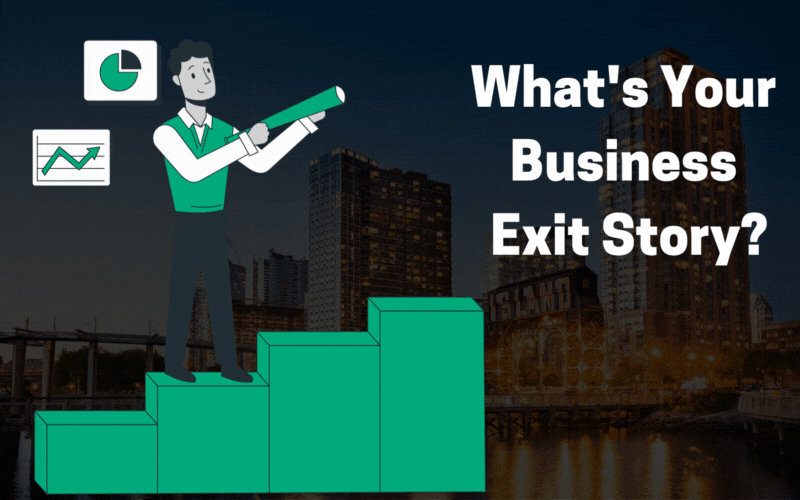
5. Selling E Commerce Business: What Is Your Business Worth?
So your business is ready to sell and now it’s time to get a valuation. The best place to start is with the industry average multiples.
A) What Is A Multiple and Why Is It So Important?
A multiple in the ecommerce business sale world refers to the number you multiply your trailing twelve months (TTM) net profit, or similarly EBITDA (Earnings before Interest, Taxes, Depreciation and amortization). You can look at the industry averages by looking at brokerages and marketplace reports. For example ecommerce brokers sellers on average get a 3.9X multiple on their TTM net profit in 2021.
Now you can look more specifically at the type of business you have and compare that to similarly sold companies. If you have a content site in the car niche and it has 100k in TTM EBITDA, look for similarly sized content sites with similar EBITDA and if you can find a car content site with the same 100k net profit, even better! Then you are basing your valuation completely on data.
B) Seller Options
You can also use a broker and marketplace valuation tool to do this research for you as they will have access to far more data over a longer period of time that you will most likely. At ecommerce brokers we do this every single day. Follow this link for a free valuation.
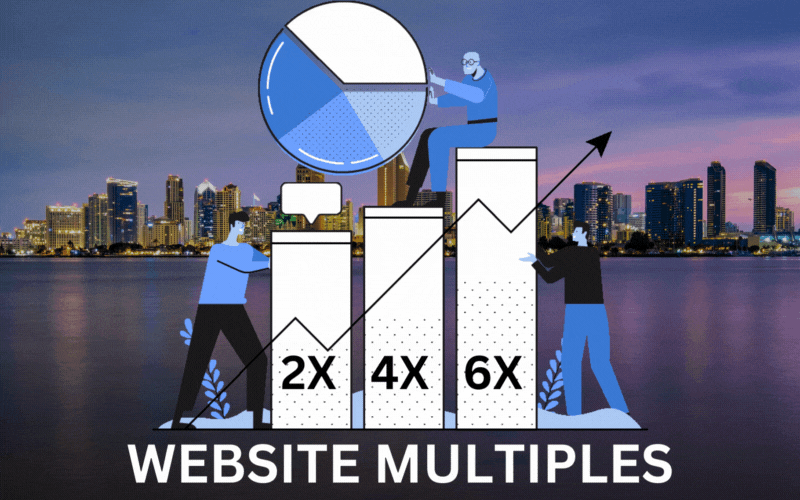
6. Selling E Commerce Business: Where Can I Sell My Business Online For Free?
So you have a rough valuation now and its time to list your business. This is when you decide to sell by yourself or sell with a broker. In my experience selling without a broker when I sold my own ecommerce businesses using a GOOD broker is far superior to selling on your own. But a bad broker is far inferior than selling on your own.
A broker will take you through the whole process and make sure you get every cent you can as fast as possible in a deal with the best deal terms possible. At Ecommerce Brokers we make a point of negotiating the best terms and price possible so much so that we earn our 10% commission purely through negotiation.
There is the option to sell your business solo and sell it on marketplaces. Brokers also use marketplaces and we are no different! We have partnerships with all the marketplaces and because we have sold millions of dollars worth of businesses on these platforms we are able to sell our listings on these platforms quicker and at a better price. That being said there is a lot of spam and low quality buyers from marketplaces and our marketplace sales account for less than 10% of our overall business sales.

7. Selling E Commerce Business: How to Prepare
Preparing your business for sale is a big part of presenting a strong and valuable business to buyers. This means cleaning up the operations and paperwork of your company. This includes making sure the right agreements with employees, freelancers and suppliers are in place, making sure your tax returns, bank statements and profit and loss sheets are in order. SOP’s or standard operating procedures are also going to need to be written up and documented so that when a buyer takes over operations are smooth and can continue as they did under the previous owner.
A) How To Conduct Data Collection
A fundamental part of making sure your website is ready to sell is collecting the right and accurate data. This includes fundamental tracking software like Google Analytics for at least a 3-6 month period as well as gathering customer data and trends like that you can find on your Shopify backend. Conversion rates and ROI figures from your marketing channels are data points that buyers are most interested in and so are crucial to collect and track. Email list data and open rates are also fundamental figures.
Buyers Favourite Data Points & Items:
- i) Returning Customer Rate
- ii) Monthly Unique Visitors
- iii) Keywords
- iv) Conversion Rate
- vi) Bounce Rate
- vii) AOV
- viii) Refund rate
B) Keep Your Financials Up To Date
There’s no more important data to have prepared than clear, accurate and up to date finances. This is the first and last thing a buyer will look at to determine interest in your business. This will include itemising every expense over the last year on a month by month basis and having this reviewed and confirmed by an accountant or bookkeeper. A seller with poorly curated financials are usually the first to be passed on by buyers.
C) Create a Standard Operating Procedure
Buying a business and having to take over the full operations is a daunting task for a buyer but they can rely on the fact that the seller has created many SOP’s for the operations of their business. From small procedures you might do over a week for things like email flows and customer support, all the way to the functions and operations of your virtual assistants and employees, these procedures need to be documented so that the buyer knows how things work.

D) Expansion Plan and Projections
If you have the time and want an unfair advantage over other sellers you can put together a thorough expansion plan. This is a document that could be one to ten pages long that cover a handful of future business opportunities that your business would take advantage of if you were to hold onto the business.
Projections
This document is not something you have to do, nor is it something that almost any sellers actually do. That being said when my seller’s or sellers team have the time I implore them to put together their projections for up to 3 years into the future taking into account expansions in product range, marketing avenues and locations. When my sellers have done this it was usually a bidding war between buyers to acquire this business. These are the documents that the buyers will take to their financiers, investors, bankers etc to show them why they should hand over their money for this deal. This leads to optimal financing terms (cash upfront) and the higher multiples 5-8X (Yes, we’ve sold businesses at 8X!).
Product Range Expansion
These documents should include the next 3-20 products you would add to your business and if you can get a few of the designs or SKU’s designed, tested and or validated that is going above and beyond for your business exit. This could include expanding into new complimentary niches or categories that are logical for your customer base.
Geographical Expansion
The best way to indicate to a buyer that your business is worth acquiring and that it will grow post acquisition is running the numbers on expanding into new geographies, and if you can, validating your assumptions with small-scale tests.
For example, if your business is in the USA so far and is going well it would be great if you could test small scale marketing campaigns in the Canada, UK, Western Europe and Australia to get an idea of ROAS and the size of the opportunity in these new markets. With those tests you can logically make assumptions in your projections for what expansions would look like into these new markets over the next 1-3 years. An added bonus is listing a few 3PL and shipping partners.
Retail
Many sellers have been approached to do sell wholesale, do partnerships or to sell through a retail chain. Yet many businesses owned by founders don’t have the bandwidth to take advantage of these offers. Listing the wholesale and retail companies that are interested in selling your product in this expansion plan will further ignite excitement for the buyer.
Marketing and Sales Channels
if you aren’t taking full advantage of marketplaces like Amazon or you’re on Amazon and you don’t have your own Shopify site, or if you have a Shopify site and you have a high repeat customer rate, but you haven’t implemented a subscription model or competent email marketing campaign list these opportunities in this document.
This helps buyers get an idea of how they can actually grow the business post acquisition.

8. Selling E Commerce Business: When Is It Time to Sell?
Identifying the right time to sell depends on many aspects of your business and can mean the difference between a sub-par exit and a highly profitable exit success. If you’re looking to cash out quickly you can expect lower multiples and low ball offers. If you’re patient and are in no rush, you’re in an advantageous position to achieve the best multiples possible
The first thing to determine is what is your true goal for you exit? If it is to get the most money possible then patience and quality is likely the best course of action. Exit planning over a 2-6 month period and preparing your business for the optimum exit will mean you will achieve the highest multiple possible at the end of this period and achieve your goal. If you’re trying to buy a house or retire, a specific number may be in mind and if you’re not at the point where your business is worth that much you’ll need to keep the business and grow it a little longer.
If you have a specific number in mind, for example $1,000,000, you can divide that by 4 (the average multiple you can sell for times the trailing 12 months net profit). So you need to generate $250,000 USD in 12 months net profit to get a $1,000,000 exit. Your goals are set and you can now work towards this.

9. Selling E Commerce Business: What Does A Broker Do?
A business broker is someone who helps in the sale of businesses. This includes the marketing, presenting of the business, communication, negotiation, due diligence and closing the deal.
Once you’ve found the right broker you will sign an exclusivity agreement. This agreement protects you and the broker as it ensures that if they find a buyer for you and they help you close the deal they will in fact get paid. It also protects your businesses confidentiality and limits the time they can work for you. On average most exclusivity agreements last for 6 to 9 months which takes into account the organizing of the listing information which can take from as little as a few days to 2 weeks. Then comes the marketing process where the broker will go out and actively look for buyers. Across the top 10 ecommerce business brokers this usually takes 1-3 months. The strength, growth, sustainability, age and profitability of the business massively determines if the business will sell fast or not.
That being said, over the next 30-60 days of listing buyers will come in and the ecommerce business broker will liaise with these buyers, negotiate price and terms and come to you, the seller with their offers and information. These buyers should all be under NDA while viewing your confidential business information. Then comes the buyer, seller and broker calls. On these calls you as the seller will be getting to know the buyer and answering a series of questions about your business. The ecommerce business broker will prepare you for these calls prior.
If you’d like to book a call with Ecommerce Brokers lead broker George Moulos you can book a call here.

10. Selling E Commerce Business: Letter of Intent and The Due Diligence Period
You’ve found a buyer who has given you a verbal or written offer what do you do next?
The next thing you’ll do is have an LOI or letter of intent put together. This is the fundamental legal agreement that will as the name suggests set out the buyers intent to buy the business. This document is usually only a few pages long but don’t let its short length deceive you. It is very important. This document has a few critical aspects to it, some that are binding and others that are not.
The LOI should:
A) Indicate the agreed upon price and financing terms
B) Have a watertight NDA clause (Although one should have already be signed this is important to have as the buyer will be looking at the inner workings of your business)
C) Watertight non-compete clause. This will indicate that the buyer cannot use the information provided by the seller to create a competing business or to use this knowledge to improve any existing businesses they have
D) Due diligence terms. The agreement should indicate generally what the buyer wants to see during the due diligence period and that the seller will do all they can to present this.
C) Exclusivity. The LOI, more than anything else, for the buyer, is there to give this buyer exclusivity to complete due diligence and buy this business for this time period. The seller cannot engage in negotiations with other buyers.
D) Period. The LOI will indicate the period which the buyer has the aforementioned exclusivity
Due Diligence Process
Depending on the size of the business the due diligence period or LOI period will differ. For a business under $750,000 USD it is normal for the DD period to take 30 days. This allows ample time for the buyer to learn about the business as well as forming the sales or asset purchase agreement
The buyer will simultaneously chat with their attorney and start the asset purchase agreement or sales agreement during this period. The buyer should have this sent over to the seller by the second week of the DD period and the seller will then have their attorney add their notes and corrections and so will the buyer until the document is complete. Ideally this is done during the DD period and so the completion date, transfer of assets and the payment can be completed only a few days after the DD period has elapsed.

11. Selling E Commerce Business: Confirm Agreements
Many buyers will be interested in a business and have conversations with sellers but when they see that the seller doesn’t have any supplier agreements in place they will leave the deal. Many sellers have verbal agreements with suppliers they have worked with for many years. However these suppliers won’t have the same loyalty to a new owner unless there is an agreement in place to bind them to an agreement.
It’s usually the case that advantageous deals add great margins to a business but the sellers don’t have this in writing from the supplier. The same goes with exclusivity of products. Although not normal for small businesses, for businesses selling a decent volume of specific niche products are sometimes able to ensure supplier exclusivity agreements for specific types of products thus making the business more defensible and attractive for a buyer.
Asset Sale vs Share Sale
During negotiations the question of whether you will sell the assets of your business to the buyer or the entirety of the legal entity in an share sale will come up. Both these options have different ramifications for buyer and seller.
Share Sale
Firstly, the share sale and acquisition of the business entity will usually mean that all the debts and liabilities of the company are carried over. In this case the seller will need to make sure that there is no outstanding debt on the business and no existing liabilities. A liability that gets a special mention here is legal proceedings.
This is a dastardly little item that if not questioned can lead to a complete and utter catastrophe for a buyer who buyers a business that hasn’t disclosed this. Although some form of legal proceedings are not completely abnormal, it is abnormal for a business to have legal proceedings that would endanger the future of the business. For example if a trademark dispute or jurisdiction dispute is ongoing this may mean that by the end of the legal proceedings the business is worth $0. This is why it is important to ask if there are any existing legal or financial liabilities of the business. It is also a big reason why an asset sale is the preference for almost all ecommerce business sales.
Asset Sale
An asset sale is the preference of almost all buyers and all sellers. For a buyer an asset sale will derisk the deal as it means they won’t be taking on any of the liabilities of the existing business and purely taking on the assets. What technically happens in an asset sale is that the buyer will setup a new company (NewCo) an during the completion period where assets are handed over, the seller will move the assets over to the NewCo and the Asset Purchase agreement will be between the Seller’s company and the NewCo.
Sellers also prefer asset sales as it is almost always the case that it means lower taxes for them on the sale of the company.
What is important to remember is that the seller must transfer legal documents such as supplier contracts over to the NewCo.

12. Three Hacks for A Higher Valuation:
A) Defensibility:
This comes down to brand equity and how well defended your business is. An easy way to do this is getting a trademark in the jurisdiction you work in as well as other jurisdictions you could work in the future. Supplier exclusivity agreements are the next step you can take. Finally patents, this usually isn’t possible for most ecommerce businesses but if you can get this it would be fantastic for your exit.
B) Automation:
The more you automate your business, the easier it is for a person to buy and then operate it. This is a massive factor that buyers look for when they are reviewing businesses.
C) 3 Strong Growth Months:
Assure that the 3 months leading up to your exit are strong. This is vital to show this business is going to continue to grow under new management.
13. Should I Sell My Online Business?
Absolutely! If you are looking for an ecommerce business broker look no further as Ecommerce Brokers is here for you. Follow this link and we can get your business listed and a valuation within 24 hours.
We also have videos about building, buying and selling ecommerce businesses on YouTube coming out every week and you can Subscribe Here!
Now I have a question for you. Do you have an ecommerce business or not? Let me know in the comments below
Author Bio: George Moulos
Forbes 30 Under 30 2020, CEO of Ecommerce-Brokers.com
I own an online M&A firm called www.Ecommerce-Brokers.com and we have 11 years experience helping buyers and sellers acquire and sell millions of dollars worth of online businesses.
Looking To Buy? Visit our Elite Acquirers buy side broker service to learn more here
Looking To Sell? Visit our List With Us page to learn more here
